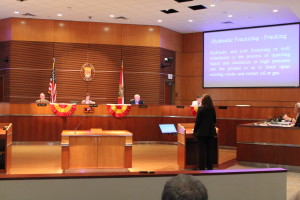
By Susan Cooper Eastman
St. Augustine, FL — The porous limestone geology underlying Florida and the massive freshwater aquifer that runs through it was on the minds of the St. Johns County Board of Commissioners on Tuesday when they unanimously passed a resolution to support a statewide ban on fracking.
In a presentation to the board, Environmental Division Manager Jan Brewer said recent studies have shown that not all of the chemical-laden water used in fracking returns to the surface to be treated, but can remain underground. The exact chemicals used are unknown because the oil and gas industry has claimed the composition is a trade secret and has so far been exempt from disclosure. But Brewer showed a partial list that includes toxic chemicals and said she’s concerned about the fracking fluid being anywhere near the aquifer.
“Ninety percent of citizens in Northeast and East Central Florida use the Floridan Aquifer as their primary source of drinking water,” she said.
“Florida is so unique in so many ways,” said Board Chair Rachael Bennett, who asked that the resolution be brought to the board. “Isn’t our particular geology easily dissolved, unlike other parts of the country that frack?” she asked Brewer.
“Yes, when our limestone base dissolves, sinkholes form,” said Brewer. She said the fluid, which is piped down underneath the freshwater formation, could dissolve the limestone from underneath and cause sinkholes.
In hydraulic fracturing, a mix of water, sand and chemicals is shot into fissures in tightly packed sand and shale to force out the oil deposits there. In acid fracturing, corrosive chemicals are use to erode and crumble up limestone and other carbonate rocks to suck out oil and gas deposits.
Florida has never been a big oil producing state, but there are deposits of oil in the remains of a tidal shoal in Northwest Florida in the Panhandle that date to the Jurassic era and in South Florida in an ancient reef system from the Cretaceous era more than a hundred million years ago. Production in wells in those two regions peaked in 1978 when 47 million barrels a day was extracted from the wells. By 1988, production had declined sharply to just 7.7 million barrels a day.
Newer oil extraction methods might reinvigorate Florida’s oil and gas industry. Although the Florida Department of Environmental Protection says Florida does not have the right geology for hydraulic fracturing, it was used twice in Northwest Florida in 2003. And in 2013, a Texas oil company used acid fracturing in a well in Collier County.
For the past few legislation sessions, oil and gas companies have lobbied the Florida Legislature to pass legislation that would make it easier to frack in Florida, and to do so without significant public or regulatory oversight. The bills faltered last May when the legislature adjourned early over a stalemate between the House and Senate, but it is expected they’ll be reintroduced in the next session. Florida law currently neither allows nor prohibits fracking and other new oil extraction methods.
Meanwhile, as the vote in St. Johns County today shows, support for a statewide ban is growing. On Aug. 24, two state Democratic senators, Darren Soto (D-Orlando) and Dwight Bullard (D-Miami), filed legislation to ban fracking in Florida altogether.
Today’s resolution asks the Florida Legislature and Gov. Scott to ban hydraulic fracturing, acid fracturing and well stimulation.
Chris Wadelton, from the county’s Soil and Water Conservation District Board, said the board passed a similar resolution in April.
“I’m really proud St. Johns County is doing this today,” his said. Wadelton reported that 36 Florida municipalities have passed similar resolutions. In Northeast Florida, Fernandina Beach and St. Augustine have passed similar resolutions.
“The people of Florida are basically against fracking,” Wadelton said.
Members of a coalition called Floridians Against Fracking met with public officials in Atlantic and Neptune Beach this week to discuss similar resolutions and planned to meet with commissioners in Nassau County, said Jacksonville member John Dubus. “Once you talk to people, it is basically a no-brainer,” he said. The group plans to meet soon with commissioners in Nassau County. “It is no good for Florida,” he said.
Click here for a map of oil permits and drilling locations from the Florida Department of Environmental Protection.
Susan Cooper Eastman has covered the environment, criminal justice and other stories in Northeast Florida for 10 years. Prior to that, she wrote longform enterprise and investigative stories for alternative newspapers in South Florida and in the Tampa Bay area. Eastman was recently awarded 1st Place in Investigative Reporting and 2nd Place in Longform News by the Association of Alternative Newsweeklies.


3 Responses
Toni Wilder
8.17.16. Today on National Public Radio, someone was stating that his “Natural Gas” was produced in St. Johns county by Fracking and that they plan to expand production. What is the story on this? Toni Wilder
editor@floridafieldnotes.com
Good question Toni. There is already some fracking going on in the state of Florida, but I don’t know about St. Johns County. Do you remember what show this comment was made during? I’ll see what I can find out. Thanks for sharing this.
ig
I could not refrain from commenting. Very well written!